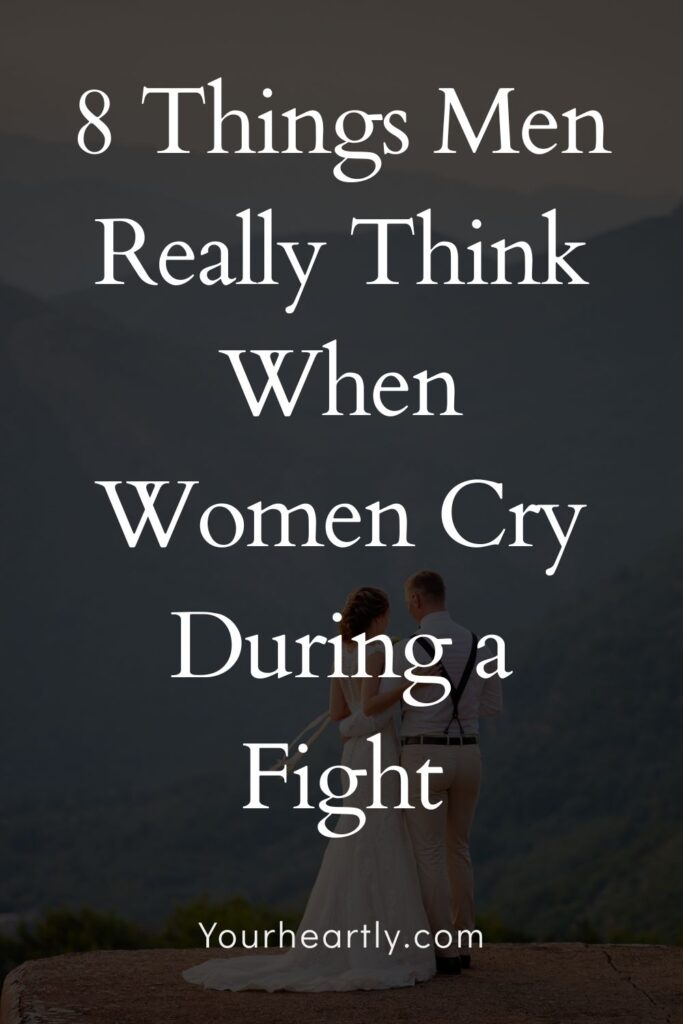Arguments in relationships are never easy. Emotions can run high, words can cut deep, and sometimes tears start to fall before you even realize it. If you’ve ever cried during a fight with your partner, you might have walked away later wondering what was going through his head in that moment. Did he feel guilty? Did he see your tears as manipulative? Or did he simply shut down because he didn’t know what to do?
Here’s the thing—you are not alone in this. Many women cry during heated conversations because tears are a natural release of overwhelming feelings. It doesn’t mean you’re weak, overly emotional, or dramatic. In fact, for most women, tears are their body’s way of processing anger, hurt, or frustration. But while crying may be your way of expressing emotions, men often interpret those tears very differently.

That’s why understanding how men typically react when women cry during a fight can help you navigate conflicts more effectively. It doesn’t mean you should hide your emotions or suppress your feelings—it simply means you’ll have more insight into his mindset. When you know what he’s thinking, you can respond in a way that strengthens the relationship instead of letting the fight spiral out of control.
In this article, we’ll break down eight common thoughts men have when women cry during arguments. Some of these will probably surprise you, while others may confirm things you already suspected. Each perspective gives you a window into his emotional world—something men often struggle to articulate themselves.
So, if you’ve ever asked yourself, “What goes through his mind when I cry?”, keep reading. You may just walk away with a deeper understanding of not only him, but also the dynamics of your relationship.
1. “I Feel Guilty, Like I Went Too Far”
When tears start rolling, many men immediately jump to the conclusion that they’ve crossed a line. Guilt becomes their dominant emotion. Even if the argument started as something small, the sight of you crying can make him feel like he’s the one who inflicted pain, whether or not that was actually the case.
Men are often raised with the belief that they should protect the people they love, especially their partners. So when your tears appear, it clashes with his sense of responsibility. Instead of seeing it as you expressing your emotions, he may see it as a direct reflection of his failure to “keep you safe” from hurt.
This guilt can create a complicated dynamic. On one hand, it might soften his anger and make him want to resolve things quickly. On the other hand, guilt can also make him defensive. He might lash out or shut down because he doesn’t know how to process the feeling of having “caused” your pain.
If you notice this pattern, it helps to reassure him that your tears are not always about assigning blame. Sometimes, simply explaining, “I’m crying because I feel overwhelmed, not because you hurt me on purpose,” can ease the weight of his guilt and open the door to healthier communication.
2. “I Don’t Know How to Handle This”
For many men, seeing their partner cry during a fight feels like stepping into completely uncharted territory. They’re unsure of what the “right” response is. Should they comfort you? Should they give you space? Should they continue the argument or stop it altogether? The uncertainty leaves them paralyzed.
This stems from how men and women are often socialized differently. Women are typically encouraged to show emotions and process them openly, while men are taught to stay strong and avoid vulnerability. Because of this, many men simply don’t develop the emotional tools to navigate tears—especially in the middle of a heated argument.
When he feels clueless about how to respond, his behavior might look cold or distant, but it’s often rooted in confusion rather than lack of care. He may worry that saying the wrong thing will only make things worse. So instead of stepping forward, he freezes, hoping the moment will pass.
If you’ve noticed your partner becoming withdrawn when you cry, it doesn’t necessarily mean he doesn’t care. More often than not, he cares deeply but feels unequipped to handle it. A good approach is to communicate what you need in those moments. Whether it’s a hug, a pause in the conversation, or just for him to listen quietly, giving him clear guidance can ease his uncertainty.
3. “Are You Trying to Manipulate Me?”
While it’s not always fair, some men interpret tears as a form of manipulation. This doesn’t mean they think you’re consciously faking your emotions—it’s more about how crying shifts the balance of power in the argument.
When you cry, it can feel like the conversation suddenly changes. He may feel silenced or guilty, making it harder for him to express his side of the story. From his perspective, the tears may come across as a way to “win” the fight by putting him in the position of the bad guy.
Of course, for most women, crying isn’t a strategy at all—it’s a genuine response to emotional overload. But because men often don’t express their emotions the same way, they might misinterpret it as intentional.
If you sense that your partner feels this way, the key is reassurance. Let him know that crying doesn’t mean you’re trying to shut him down. Clarify that you still want to hear his side and work through the issue together. This can prevent him from viewing your tears as manipulation and instead see them for what they really are: an honest reflection of your feelings.
4. “I Just Want This to End”
Fights are exhausting, and when tears enter the picture, many men’s immediate thought is to end the argument as quickly as possible. Your crying makes the conflict feel heavier, and instead of working through the issue, he may want to “wrap it up” just to make the discomfort stop.
This can lead him to apologize prematurely, change the subject, or retreat entirely. While this response might temporarily stop the fight, it doesn’t solve the underlying problem. In fact, it can leave both of you feeling frustrated because the real issue remains unresolved.
For men, this reaction is often about self-preservation as much as it is about caring for you. The intensity of seeing you cry may trigger his own discomfort with emotions, and ending the fight feels like the easiest escape.
To prevent this cycle, it can help to suggest taking a pause instead of rushing to a resolution. Something as simple as saying, “I need a few minutes to calm down, then we can continue,” gives both of you the space to reset without sweeping the problem under the rug.
5. “I Feel Like the Bad Guy”
Tears have a powerful way of shifting the emotional tone of any argument. When you cry, men often feel instantly cast into the role of the villain. Even if he believes he has a valid point, your tears make him question whether he’s the one entirely at fault.
This dynamic can be frustrating for him because it feels like the emotional weight is suddenly unbalanced. He might think, “Even if I’m right, how can I argue against her when she’s crying?” The sense of being the “bad guy” can either make him defensive or push him into shutting down completely.
The reality is that your tears don’t make him wrong—but that’s not how it feels in the heat of the moment. His focus shifts from the issue at hand to his own role in causing your distress.
A helpful way to ease this is by separating your emotions from blame. Saying something like, “I’m not crying because I think you’re terrible, I’m crying because this is important to me,” allows him to understand that your tears are about the situation, not about demonizing him.
6. “I Can’t Focus on the Argument Anymore”
Crying changes the dynamic of a fight instantly. For many men, once the tears begin, it becomes impossible to concentrate on the actual topic of the disagreement. Instead, all of his attention shifts to your emotions.
This is why some arguments go in circles. He might stop addressing the original issue and instead fixate on how to make the tears stop. While this comes from a place of care, it can derail productive communication. You walk away feeling like the problem wasn’t solved, and he walks away feeling drained from trying to “manage” emotions rather than resolve the conflict.
Understanding this shift can help you both. If you notice that the fight is getting off track, it may be best to pause and return to the conversation later when you’re calmer. That way, he can focus on the actual issue instead of being overwhelmed by the emotional intensity of the moment.
7. “I Feel Powerless”
For many men, crying brings up feelings of helplessness. They want to fix the problem, but tears are something they can’t easily “solve.” Unlike a practical issue where he can step in and take action, your emotions leave him without a clear solution—and that lack of control can be deeply uncomfortable.
This sense of powerlessness often makes men shut down or withdraw. It’s not because they don’t care, but because they don’t know how to be effective in the situation. He may think, “No matter what I say, it won’t make a difference.”
The truth is, you probably don’t expect him to “fix” your feelings—you just want him to be present. Communicating this directly can be a game-changer. Letting him know that you don’t need answers, only empathy, can relieve him of the pressure to fix everything and help him show up for you in a more supportive way.
8. “I Still Love You, But I Don’t Understand”
At the end of the day, most men don’t see crying as a sign of weakness or unworthiness. Instead, they see it as something they simply don’t understand. They may not fully grasp why tears flow during conflict, but that doesn’t change their feelings of love for you.
He might think, “I love her, but I’ll never really get why she cries when we fight.” This gap in understanding doesn’t mean he doesn’t care—it just highlights the differences in how men and women process emotions.
For many women, crying is a natural response to stress, while for many men, it’s something unfamiliar and confusing. Bridging this gap starts with communication. By explaining what your tears mean for you—whether it’s overwhelm, hurt, or needing a moment to pause—you help him interpret the situation more accurately.
This builds empathy and prevents misinterpretations. Even if he never fully “gets it,” he can learn to respect your emotional process and stand by you without judgment.
Conclusion
Crying during a fight is often misunderstood. For you, it may be a natural way of expressing pain or stress, but for your partner, it triggers a complex mix of emotions—guilt, confusion, helplessness, and even love. Understanding what men really think in these moments can shift how you approach conflicts together.
The key takeaway is that your tears are not a weapon, and they don’t make you weak. They’re simply a part of who you are and how you process emotions. For men, learning to interpret tears without judgment takes time and communication.
If you’re open about what your crying means and what you need in those moments, you give your partner the tools to respond with empathy instead of defensiveness. Over time, this can turn fights into opportunities for deeper understanding rather than barriers to connection.
So the next time tears fall during an argument, remember—he might not fully understand them, but with patience and honesty, those moments can bring you closer instead of pushing you apart.
FAQs
1. Is it normal to cry during arguments with my partner?
Yes, it’s completely normal. Crying is a natural way of releasing built-up stress and emotions. Many people cry when they feel overwhelmed, even if they don’t intend to.
2. Do men see women as weak when they cry?
Most men don’t see tears as weakness. They often feel confused, guilty, or unsure how to respond, but not necessarily judgmental.
3. How can I stop my partner from shutting down when I cry?
Clear communication helps. Let him know what you need in that moment—whether it’s a pause, comfort, or just space to feel your emotions.
4. What if my partner thinks I’m manipulating him when I cry?
Reassure him by clarifying that your tears are not meant to control the situation but are simply an emotional response. Transparency can ease misunderstandings.
5. Should I try to hold back tears during fights?
No, suppressing your emotions isn’t healthy. Instead of holding back, focus on explaining what your tears mean so your partner understands them better.





